
What is Hezbollah’s role in Syria?
We discuss rising rumours about the Lebanese Shia group’s involvement in Syria’s ongoing civil conflict.
It has been a week of maneuvering on the diplomatic front, but with little to show for it.
On Monday, Walid al-Muallem, Syria’s foreign minister, said the government in Damascus is ready to talk to armed opposition groups in an attempt to end the violence. He also said President Bashar al-Assad and his allies are open to negotiations but he did not say under what conditions.
|
“The real truth is that the IRGC and the ministry of intelligence in Iran has relatively few Arabic speakers … so Hezbollah would be an essential linguistic link in its efforts to help the Syrian regime and I think we are just hearing more about it because the Syrian regime is obviously in greater trouble than it was six months back.“ – Reuel Marc Gerecht, former Middle East specialist at the CIA |
The Syrian foreign minister had been meeting Russian officials in Moscow, but opposition leaders remain sceptical.
On Wednesday, the opposition Syria National Council attended crisis talks in Rome after saying earlier it would boycott the Friends of Syria meeting. The group then backtracked after the US and Britain promised more aid for rebel fighters.
On Thursday, for the first time, the US said it will directly help the Syrian opposition fighters. The new secretary of state, John Kerry, announced that his government will send food and medical supplies to the fighters but there will be no weapons and no air support.
Al-Muallem has criticised the US decision to provide direct aid to the opposition.
But our main focus in this week’s programme is the role of Hezbollah in the Syrian conflict. Over the last few weeks, the Free Syrian army has accused the Lebanese Shia armed group of fighting on behalf of the Assad government.
|
“There is no doubt that Hezbollah is a large supporter of Bashar al-Assad and in my estimate Hassan Nasrallah [will] declare when and and if asked by Hezbollah they will consider the support, but at this point I don’t think Hezbollah have any involvement in Syria except in those [25] towns which mostly the inhabitants are defending themselves because they are mostly Shia and live in that area for hundreds of years.“ – Kamel Wazne, a political analyst |
Reports have also been published in several Lebanese media that say it is playing an increasing role in the Syrian conflict. Hezbollah has denied allegations of military involvement.
At the same time has also made it clear that it supports the Syrian government while calling for dialogue and reforms.
For years, Syria was an access route by which Hezbollah was able to acquire support from its main backer Iran.
The Syrian regime aided and supported Hezbollah’s resistance to Israeli occupation, and so was considered an ally despite their differences.
Its leader Hassan Nasrallah has said this week: “Until the moment, we have not fought alongside the Syrian regime. It has not asked us to do so.”
But later he said: “If there ever comes a day when our responsibility demands that we fight in Syria, we will not conceal that, but there is no such thing at the moment.”
Similar accusations have also come from the US department of the treasury. In a statement issued in October, it said: Hezbollah has provided training, advice and extensive logistical support to the government of Syria’s increasingly ruthless efforts to fight against the opposition.
So to discuss the role of Hezbollah in the Syrian conflict on Inside Syria, presenter Hazem Sika is joined by guests: Abu Rami, a spokesman of the Syrian Revolution General Commission; Reuel Marc Gerecht, a senior fellow at the Foundation for the Defence of Democracy. He is also a former Middle East specialist at the CIA; and Kamel Wazne, a political analyst and a professor at the Lebanese University. Wazne is also the director and founder of the Centre for American Strategic Studies in Beirut.